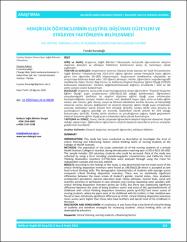| dc.contributor.author | Karadağlı, Funda | |
| dc.date.accessioned | 2019-05-20T09:27:08Z | |
| dc.date.available | 2019-05-20T09:27:08Z | |
| dc.date.issued | 2016-12-31 | |
| dc.identifier.issn | 2146-9601 | |
| dc.identifier.issn | 2147-2238 | |
| dc.identifier.uri | http://hdl.handle.net/11363/1264 | |
| dc.description.abstract | Araştırma, Sağlık Bilimleri Yüksekokulu hemşirelik öğrencilerinin eleştirel düşünme düzeyleri ve etkileyen faktörlerin belirlenmesi amacı ile tanımlayıcı olarak yapılmıştır. Araştırmanın evrenini, İstanbul ilinde bulunan bir Vakıf Üniversitesinin Sağlık Bilimleri Yüksekokulu’nda 2014-2015 eğitim öğretim yılında hemşirelik lisans eğitimi gören tüm öğrenciler (N=185) oluşturmuştur. Araştırmanın örneklemine, ulaşılabilen ve araştırmaya katılmayı kabul eden 139 öğrenci alınmıştır. Veriler, öğrencilerin sosyodemografik özelliklerine ilişkin Tanıtıcı Bilgi Formu ve Kalifornia Eleştirel Düşünme Eğilimi Ölçeği (CEDEÖ) kullanılarak toplanmıştır. Verilerin değerlendirilmesinde bağımsız örneklerde t testi ve tek yönlü varyans analizi kullanılmıştır. Araştırma sonucunda araştırma kapsamına alınan öğrencilerin “Eleştirel Düşünme Eğilimi Ölçeği” puan ortalamasının (196.56±22.28) olduğu belirlenmiştir. Öğrencilerin sosyodemografik özellikleri ile eleştirel düşünme eğilimi ölçeği puan ortalamaları karşılaştırıldığında; cinsiyet, medeni durum, sınıf, akademik başarı algısı, anne ve baba eğitim düzeyi, aile tutumu, gelir düzeyi, sosyal ve bilimsel etkinliklere katılma durumu ve hemşireliği isteyerek seçme durumu değişkenleri ile eleştirel düşünme eğilimi ölçeği puan ortalamaları arasında istatistiksel olarak anlamlı fark olmadığı (p>0.05), kardeş sahibi olma durumu ile çocukluğunun çoğunu geçirdiği yer arasında istatistiksel olarak anlamlı bir fark olduğu bulunmuştur (p<0.05). Kardeş sahibi olanların ve çocukluğunun çoğunu ilçede geçirenlerin eleştirel düşünme eğilimi ölçeği puan ortalamaları daha yüksek bulunmuştur. Sonuç olarak çalışmada öğrencilerin eleştirel düşünme düzeyinin düşük olduğu saptanmıştır. Eğitimcilerin öğrencilerin eleştirel düşünme becerilerini arttırıcı stratejiler geliştirmesi önerilebilir. | en_US |
| dc.description.abstract | This study has been conducted as descriptive to investigate the level of riti al t inkin and İnfluen in fa tors riti al t inkin levels of nursin students at t e Colleges of Health Sciences. The population of the study comprised all of the nursing students of a private Health Sciences Colleges in Istanbul, during the education-teaching year of 2014-2015 (N=185). The sample includes 139 voluntary students who could be accessed. Data of the study was collected by using a form including sociodemographic characteristics and California ritical Thinking Disposition Inventory (CCTDI).Data were analyzed through using the t-test for independent samples and one-way ANOVA. According to the findings of this study, it was determined that the mean score of the riti al t inkin disposition inventory were found as 96 56±22 28 w i is a epted as low level critical thinking skills. The demographic characteristics of students with average scores compared critical thinking disposition inventory; There was no statistically significant differen es between t e mean s ores of student’s ender, marital status, lass, a ademi achievement perception, parents education level, family attitudes, income level, social and scientific activities to participate in case selection and nursing requesting state variables with critical thinking disposition inventory points (p> 0.05), but there was statistically significant difference between the state of being brothers owner and most of the spentsettlements of childhood with critical thinking disposition inventory points (p<0.05).Total mean scores of nursing students. where he spent most of his childhood with his brother in that condition was found to have statistically significant difference (p <0.05). critical thinking disposition inventory mean scores were higher than those who have brothers and spend most of his childhood in the town. In conclusion, it was found that a low level of critical thinking of students and therefore strategies for increasing students' critical thinking skills can be developed by educators. | en_US |
| dc.language.iso | tur | en_US |
| dc.publisher | Balıkesir Üniversitesi | en_US |
| dc.relation.isversionof | 10.5505/bsbd.2016.96658 | en_US |
| dc.rights | info:eu-repo/semantics/openAccess | en_US |
| dc.rights | Attribution-NonCommercial-NoDerivs 3.0 United States | * |
| dc.rights.uri | http://creativecommons.org/licenses/by-nc-nd/3.0/us/ | * |
| dc.subject | Research Subject Categories::MEDICINE | en_US |
| dc.title | Hemşirelik Öğrencilerinin Eleştirel Düşünme Düzeyleri Ve Etkileyen Faktörlerin Belirlenmesi | en_US |
| dc.title.alternative | The Critical Thinking Levels of Nursing Students and Influencing Factors | en_US |
| dc.type | article | en_US |
| dc.relation.ispartof | Balıkesir Sağlık Bilimleri Dergisi | en_US |
| dc.department | Sağlık Bilimleri Yüksekokulu | en_US |
| dc.identifier.volume | 5 | en_US |
| dc.identifier.issue | 3 | en_US |
| dc.identifier.startpage | 123 | en_US |
| dc.identifier.endpage | 128 | en_US |
| dc.relation.publicationcategory | Diğer | en_US |



















